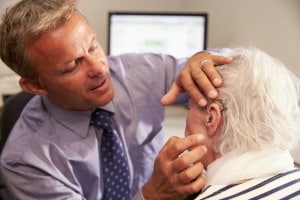Hearing health becomes more and more of an issue as seniors age. Seniors can lose their hearing in a variety of ways, including hearing damage, medication side effects, illnesses, and cognitive changes. Hearing loss affects communication, makes socializing more difficult, and affects quality of life. In-home care providers can play a vital role in helping seniors maintain their hearing health, even if they are experiencing some hearing loss.
Monitoring and Assessment
In-home care providers understand what it can be like for aging adults to start experiencing hearing trouble. They also know that it can be difficult for family members to keep up with hearing changes, especially if seniors aren’t aware of these changes themselves. Caregivers can monitor changes in hearing and ensure that family members and medical providers are aware of these differences as they occur.
Helping with Hearing Aid Maintenance
For seniors who are already using hearing aids, proper hearing aid maintenance is essential. In-home care providers can help with cleaning hearing aids properly and regularly, replacing batteries, and ensuring that hearing aids fit properly and function. This can be invaluable assistance for seniors who become frustrated when their hearing aids don’t function as expected.
Promoting Healthy Lifestyle Choices
As with any health issue, healthy choices consistently can be important in maintaining overall well-being. This is true with hearing health, too. Seniors who are generally choosing healthier habits like maintaining a balanced diet and staying physically active benefit from those decisions. Caregivers can also help seniors avoid things like spending excessive amounts of time around loud noises, which can be damaging to hearing.
Assisting with Communication
In-home care providers are also skilled at helping aging adults communicate with other people. They’re not frustrated by seniors who have trouble hearing or who have challenges being understood because they don’t hear themselves well. They can help family members learn techniques like speaking more clearly and facing the person with hearing difficulties directly to improve communication.
Engaging in Stimulating Activities
Hearing health is closely tied to brain health, which means that it’s important for seniors to keep their brains engaged and stimulated along with their ears. Activities like listening to music, talking to other people, and participating in activities that involve hearing and auditory processing are great for hearing and for the brain.

Helping Create a Hearing-friendly Environment
For someone with hearing challenges, a hearing-friendly environment can make those difficulties easier to manage. In-home care providers can be on the lookout for issues related to sound interference and can help to ensure that seniors have what they need at home. Using new assistive devices and technology can also be complicated, and caregivers can help with these.
Preserving hearing health as much as possible is important for the overall quality of life for seniors. In-home care providers can focus on the activities and assistance that aging adults need to maintain hearing as well as they possibly can. Caregivers are also there for other types of support as necessary.
If you or an aging loved one are considering In-Home Care Services in Norfolk MA, please contact the caring staff at Care Resolutions, Inc. today. (508) 906-5572
CARE Resolutions, Inc. provides quality 24-Hour Home Care for seniors and families in Walpole, Dover, Wellesley, Framingham, Norfolk, Quincy, Weston, Medfield, Boston, Sherborn MA, and surrounding areas.
- Tips for Seniors Who Want to Try Social Media - April 7, 2025
- How Can Seniors Transition Home from the Hospital Smoothly? - March 19, 2025
- Can Seniors Get Fit and Stay Active with Chronic Health Issues? - March 6, 2025


